Voices of the People Keeping Food on Our Tables

The economic fallout from Covid-19 has driven millions of people across the world deeper into hunger and poverty since last year, according to the United Nations World Food Programme (WFP), which is aiming to assist a record number of people due to the pandemic.
Globally, food prices have continued to rise, reaching its highest point since 2011. In Bangladesh too, food prices have increased across the country while incomes of up to 77 percent of people have declined during the pandemic, making it harder for people to access the foods they and their families need.
Essential workers – from our fields to our markets – have helped keep Bangladesh's food supply chain strong in the face of these challenges. Now, during the country's third nationwide lockdown, we're reminded of the dangers essential workers face and the critical role they play in our lives as the pandemic rages on.
We spoke to eight workers, representing the thousands of people throughout the food supply chain, who shared their experiences of risk, determination, resilience, and hope. Their interviews have been edited for brevity and clarity in some places.
Md Rezaul Karim
Grocery Delivery Driver, Cox's Bazar
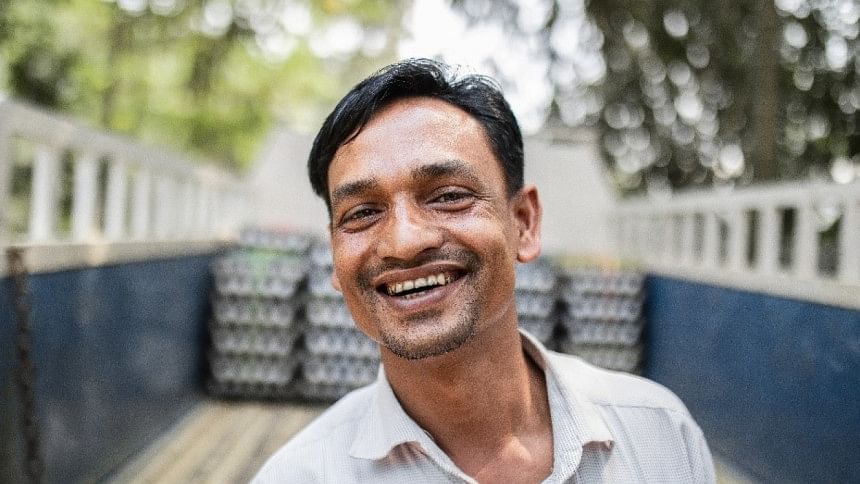
I work as a driver for Chaldal, one of Bangladesh's biggest online grocery stores. I deliver food to different centres and transport food items from one place to another.
I feared this disease a lot. If I had the financial ability to support my family, I would not have opted for work. I would have stayed home so that I could guarantee my family's safety.
I worked during the first wave of Covid-19. It was a difficult period for me. As most of the roads were closed, I had to be cautious while driving. I had to keep my documents with me at all times in case I was stopped at checkpoints. Despite these restrictions, I enjoyed driving back then since the roads were empty and there was little to no traffic.
I think people who haven't suffered first-hand are negligent about Covid now. It's very much a reality now. Yes, we do have vaccines, but there are people who still can't get them. I don't want to go back to where we were last year. I try my best to encourage people to be conscious of themselves and their surroundings. I hope there will come a day where we won't have to wear a mask.
Umme Habiba
Farmer, Cox's Bazar
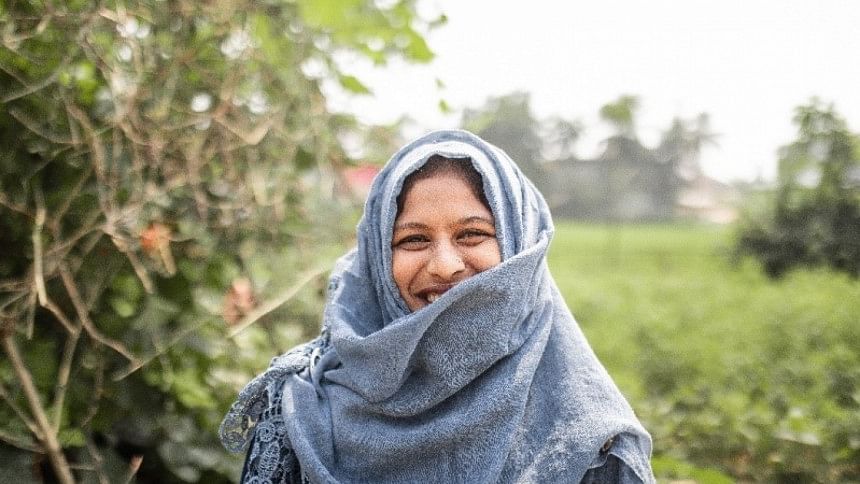
The coronavirus lockdown wasn't a pleasant experience for me or my fellow farmers. I didn't want my vegetables to rot; I would sell them at any cost. I had to take several risks. The local bazaars were closed. Transportation access was limited. When I did manage to sell my produce, I often incurred losses instead of gaining a profit.
Telephone communication proved to be an effective way to sell our produce. My husband collected the phone numbers of local retailers and we were able to fix a price and sell to them over the phone. In many instances, we arranged our own transport, went to nearby villages and sold eggs and other vegetables. Giving up wasn't an option.
My husband was very supportive of my work. I was able to help my neighbours with my produce and income. I was fortunate enough to have food at my house. Many people were not as fortunate. Knowing that, I couldn't let them stay hungry. Given the same conditions, I am sure my neighbours would have helped me.
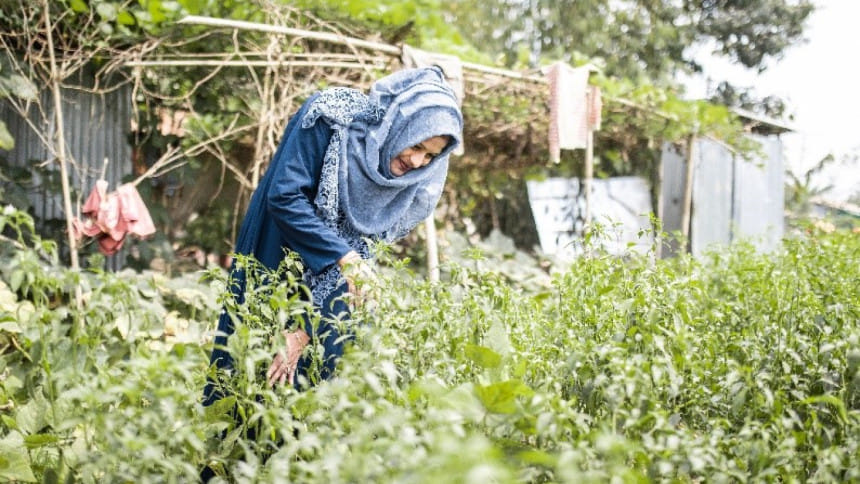
I found a sense of community in this period. Even though we were isolated, we were all in this together.
Md Mokaddesur Rahman Mukul
Owner, Purity Dry Fish Company, Cox's Bazar

Since we work with food, if we don't produce, people won't get food. It's that simple.
I am a scientist by training. I developed the greenhouse technology to produce organic, dry fish. Our factory was fully functional and operational during the first wave of Covid-19. We work with the UN World Food Programme (WFP) and their retail partners as part of the Rohingya response, so we had to ensure the supply of dry fish for the refugee population continued. It was challenging. Sending the fishermen to the sea was specifically arduous.
We also had an increased demand for dry fish from our retailers throughout Bangladesh during the pandemic. As people couldn't go out much, buying dry fish was the only feasible option for many of them. The work pressure was immense. We needed to renovate the factory as well. We had to install handwashing stations, build staff quarters, washrooms, and cooking facilities.
Most of my staff are their families' sole income earners. They worked and lived at the factory for two weeks at a time, rotating in groups, to help reduce the chance of infection at work. In case of any emergency, medical support was available to them and we made sure their families were provided food items. It was extremely challenging, but I didn't think there were any other options.

I cannot begin to describe the nature or type of support I got from my colleagues here. Be it working round the clock, or boosting my morale, my staff was already there whenever I needed them. I prioritised the safety of my workers and requested them to make hard choices. There were times I pushed hard Covid-19 safety precautions, but every time they cooperated with me.
Abdul Alam
Tomtom Driver, Cox's Bazar
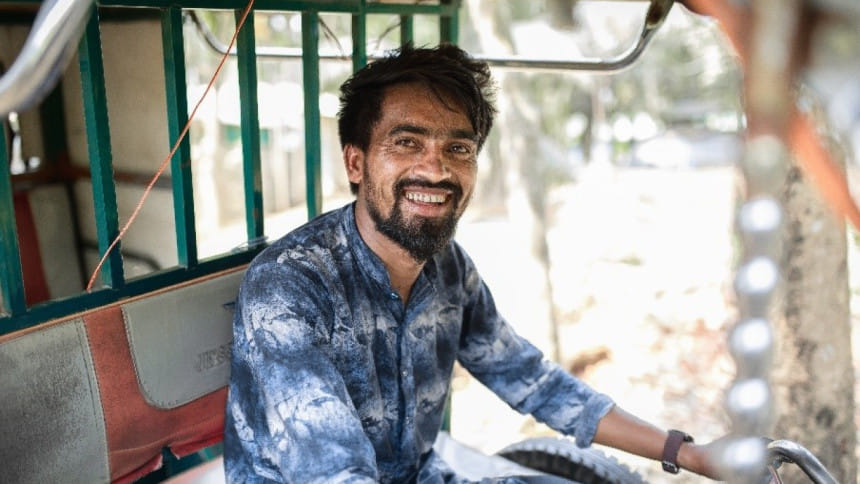
I have been driving this tomtom for two years now in Cox's Bazar. I have never experienced anything like the lockdown.
I used to pick and drop the nurses from the local hospital initially. Then, I started to deliver food and goods in different places during the lockdown. I couldn't drive on the main road. My income was significantly reduced. I used to earn 1000 to 1200 taka per day before Covid. During the lockdown, it came down to 200 to 300 taka.
In my family, I only have my mother. I struggled a lot to explain to her why I needed to go to work. She was constantly worried about me. I was also worried I might bring the virus home. But I had no choice, my family depends on me.
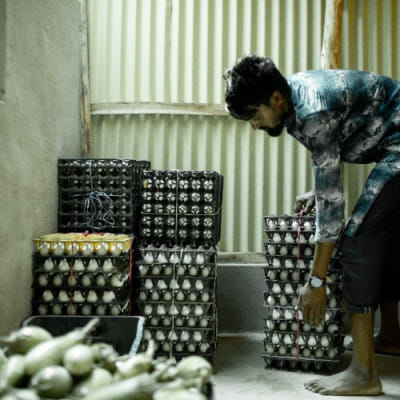
I started working with WFP in March this year. I have never had help before. Here, people help me load and unload things. It's still difficult to maintain the mask mandate. But I am trying.
Vaccines give me hope. I hope that soon, my mother and I will be vaccinated, and we will once again enjoy our lives like we used to.
Md Farukul Islam & Md Shafikul Islam
Fishermen, Cox's Bazar
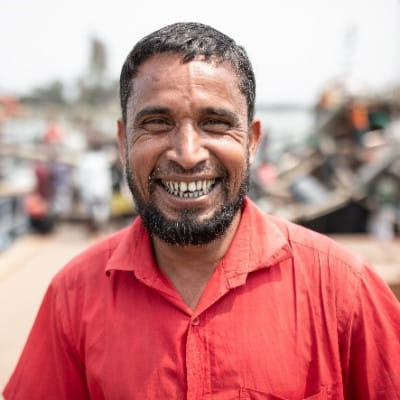
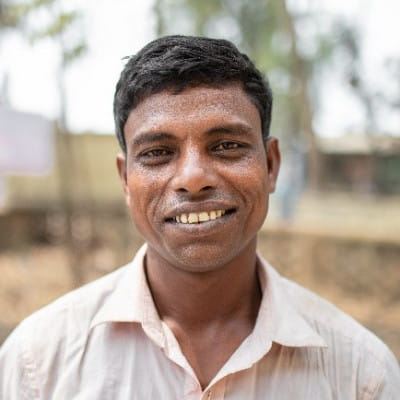
We work in fishing boats here in Cox's Bazar. Generally, we would go to the sea twice a month for fishing trips, each for ten or twelve days at a time. Since the pandemic, we haven't been on a single trip.

During the lockdown, our boats didn't go out to the sea. We went back home to the northern part of Bangladesh. We couldn't manage any work there either. We had no income and little savings. Mostly, we borrowed money from our relatives and neighbours. With that money, we barely managed to have some food.
Both of us were scared last year. Healthcare facilities weren't accessible in our villages. None of us or our family members were infected with Covid, but we were often worried we would be. Because then we would have nowhere to go.

We came back to Cox's Bazar when the government eased the lockdown. Fishing trips are still not regular, but we get by. The business isn't as flourishing as it used to be before Covid. But at least we don't have to borrow from people anymore.
Sultan Islam
Porter, Kutupalong Refugee Camp, Cox's Bazar

My wife and I never discuss my work. But she realises the gravity of the work I do, and that if I don't show up, people won't get food. I have never had to explain it to her.
Before starting work as a porter, I used to be a teacher at a madrasa, here, in Cox's Bazar. Managing different groups of people never seemed like a huge task for me. I wore many hats last year. I was managing the porters and worked as a porter myself. I simultaneously managed people as they came to get their groceries and helped the staff to prepare food items in the shops.
As a porter, maintaining distance with the refugees was tricky for us. We were never used to carrying sacks of rice while wearing masks. We frequently stopped to breathe and take some rest. But that would take us longer than usual to carry items home. We also had to request people to maintain distance repeatedly while shopping and, at the same time, to be mindful of the timing. We didn't want people to spend a lot of time inside the shops. Sometimes they understood, other times it was a bit challenging for us to explain to them why we are discouraging them to be inside the shops.
In my family, we never explicitly talked about it, but the fear associated with the disease and what it would bring was always there. I was aware that I might bring the disease home, being the only person working outside. Therefore, I tried to be extra cautious at all times. I will always be grateful to my wife for her support.
Shafika Sultana
Retail Assistant, Kutupalong Refugee Camp, Cox's Bazar
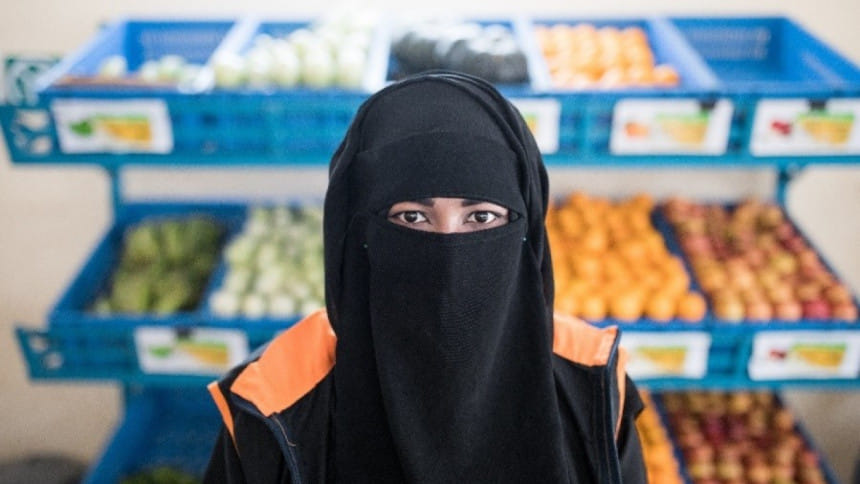
As a mother of a young boy, I was constantly worried. What if I bring the virus home? I live with my in-laws who are old. I have had my fair share of doubts about work. At the same time, I couldn't neglect my duty. I realised that a lot of people relied on us for food.
I worked as an essential worker during the first wave of Covid-19. I was assisting with voucher payments and receipts. It all seems obscure now, as if it happened a long time ago. But I can assure you it wasn't a good time.
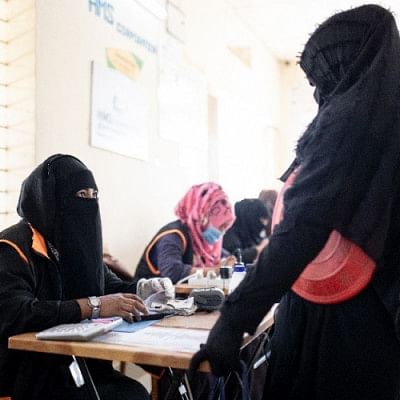
Being a social person who loves spending time with people, the entire period was difficult for me. Maintaining our distance and not being able to talk to people as much was challenging.
We were given transport facilities during the pandemic. I would look forward to our time in the car so much. Although we had to maintain our distance, my colleagues and I would talk about our days at work. We would talk about what we would do once the pandemic is over. For half an hour every day, we had normal lives, or at least as normal as we could be while wearing masks.
Md Omar Faruk
Retail Staff, Kutupalong Refugee Camp, Cox's Bazar

I worked at an food assistance outlet for Rohingya during the first wave of COVID-19 as a retail staff for HMS Corporation. I was quite happy to be working. Many of my peers from my community lost their jobs at that time. Coming to work, thus, was a relief for me.
The most challenging part for me was getting used to the safety gear. I wasn't used to wearing masks back then, as I am now. I also had to wear PPE and gloves. It used to feel suffocating, especially if you are working in this environment in the heat. But as I was the only one coming out for work from my family, I was worried about their safety as well.
As strange as it sounds, we had a good time at work back then. After the regular work hours, my colleagues and I used to prepare the pre-packed packages of food items so that refugees can quickly take their food. Every day, after the regular work hours, we used to sit and pack the food. In hindsight, I think we formed a special bond there. All of us were afraid and scared of what's to come, that is for sure. However, we also knew that we have this time together to forget about our worries just for a little bit.

I think our work here during the pandemic had a deeper impact. If we didn't work, so many people here would not have received food at all and fewer farmers would have been able to sell their produce. This shop would have been closed. I didn't intend it to be that way.
I am happy that my work made a difference. Knowing that people didn't go to bed hungry because of what we did here, makes all the hard work worth doing.
Nalifa Mehelin is a Communications Associate for the UN World Food Programme, the world's largest humanitarian organization, saving lives in emergencies and using food assistance to build a pathway to peace, stability and prosperity. WFP has been working in Bangladesh since 1974.

 For all latest news, follow The Daily Star's Google News channel.
For all latest news, follow The Daily Star's Google News channel. 




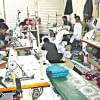


Comments